2012中考一轮复习精品课件(含2011中考真题)英语牛津译林版七上(115张ppt)
文档属性
| 名称 | 2012中考一轮复习精品课件(含2011中考真题)英语牛津译林版七上(115张ppt) | 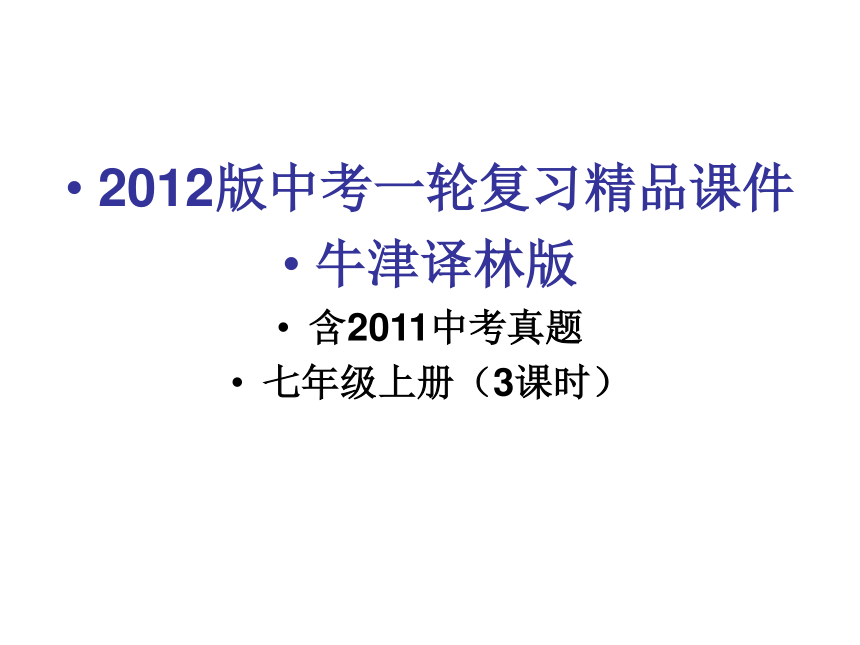 | |
| 格式 | rar | ||
| 文件大小 | 947.2KB | ||
| 资源类型 | 教案 | ||
| 版本资源 | 通用版 | ||
| 科目 | 英语 | ||
| 更新时间 | 2012-01-12 10:41:39 | ||
图片预览

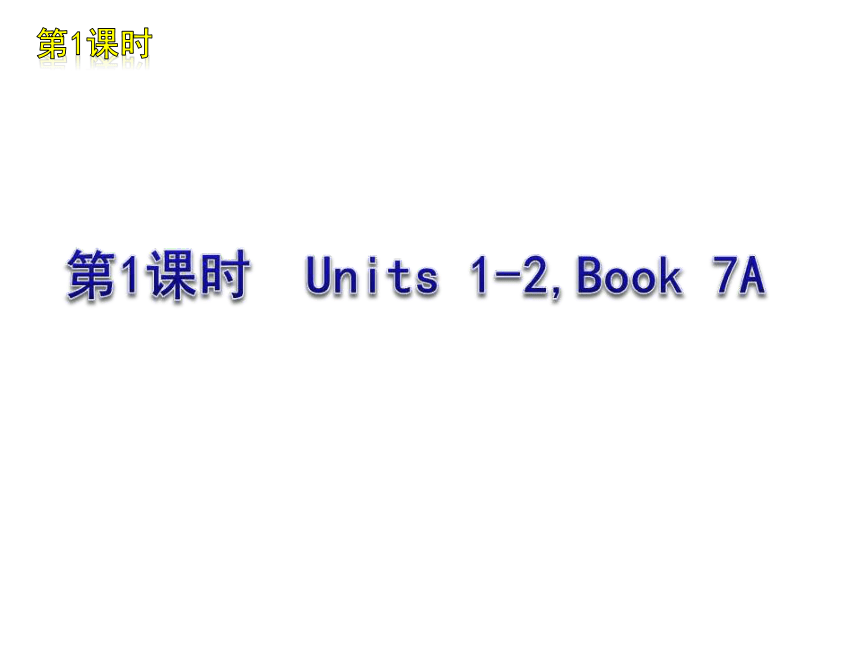
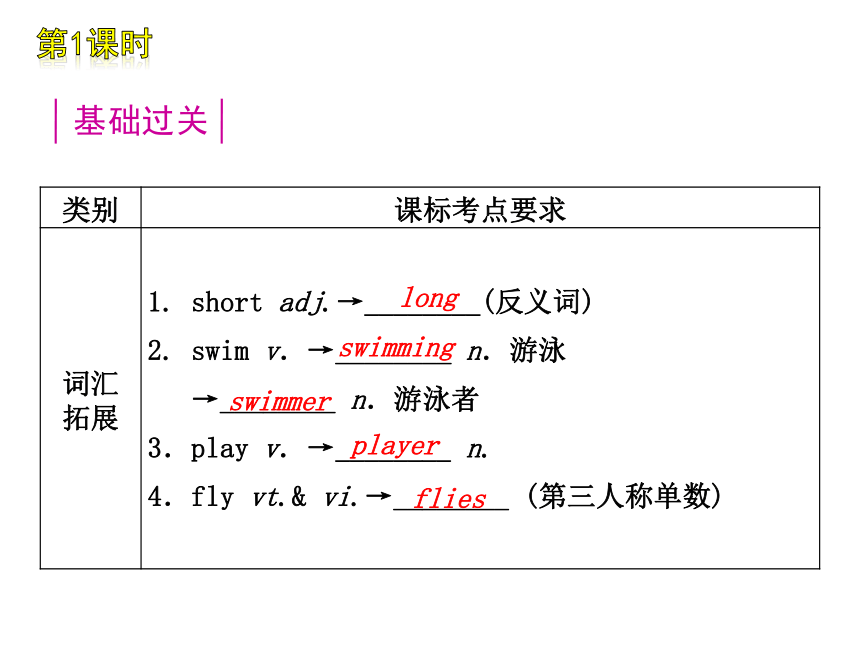
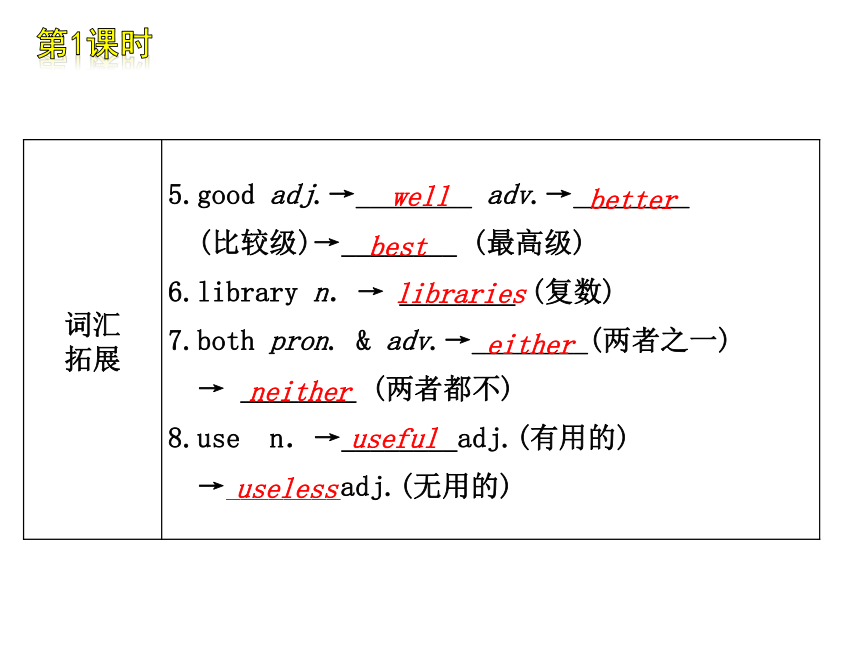
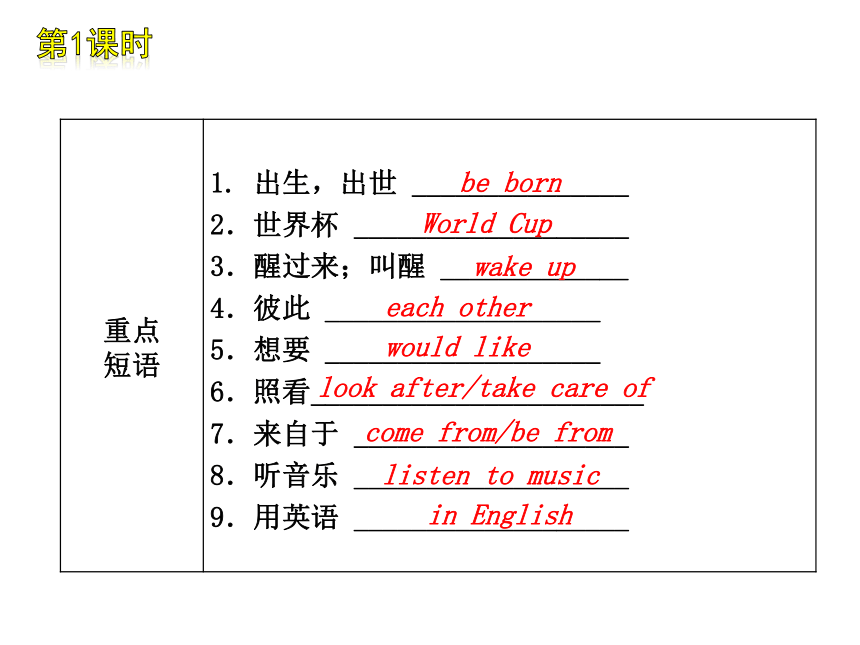
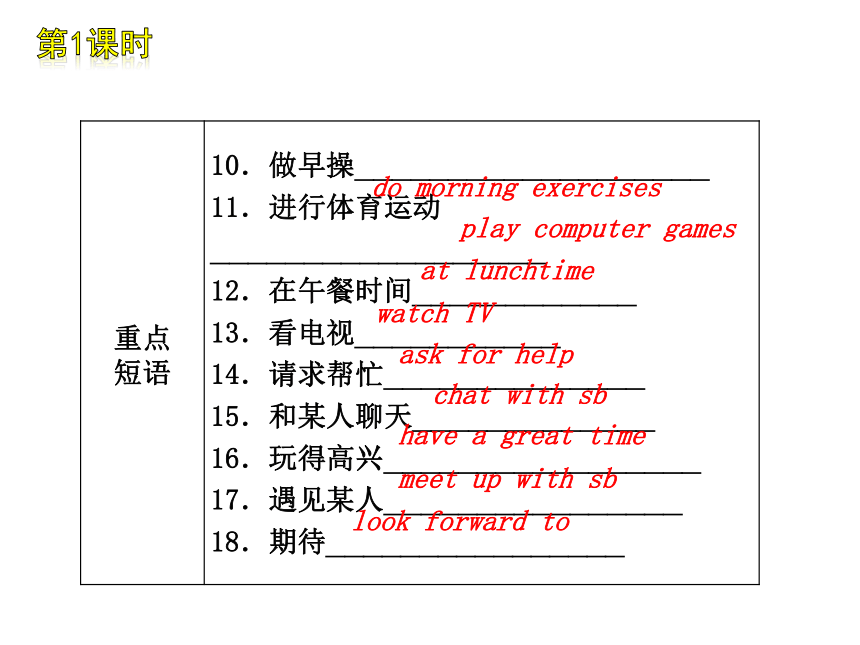
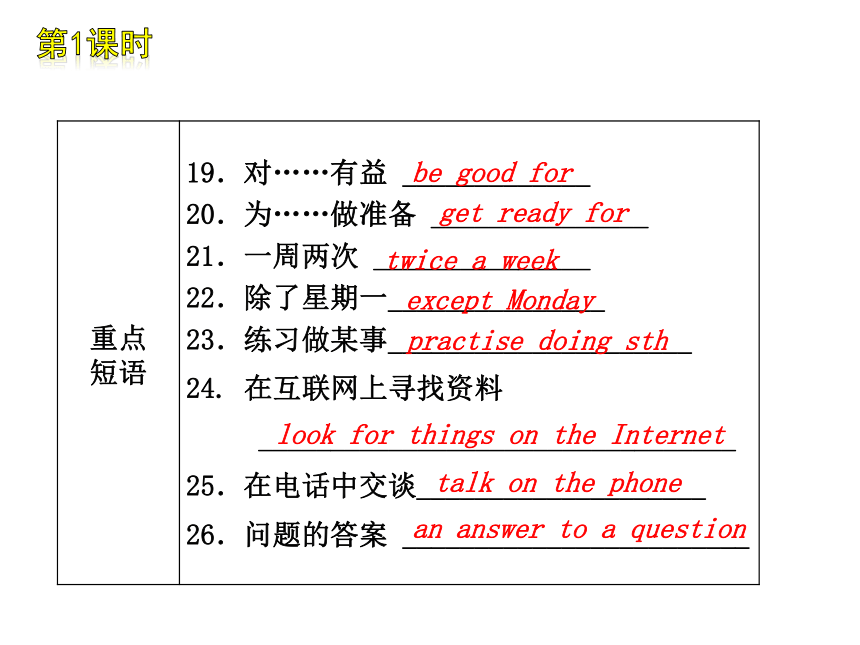
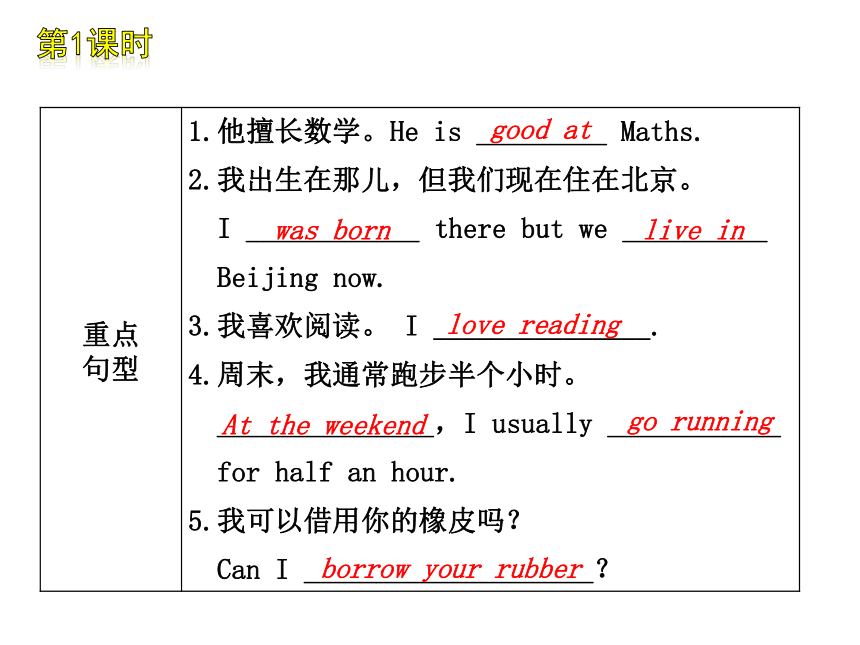
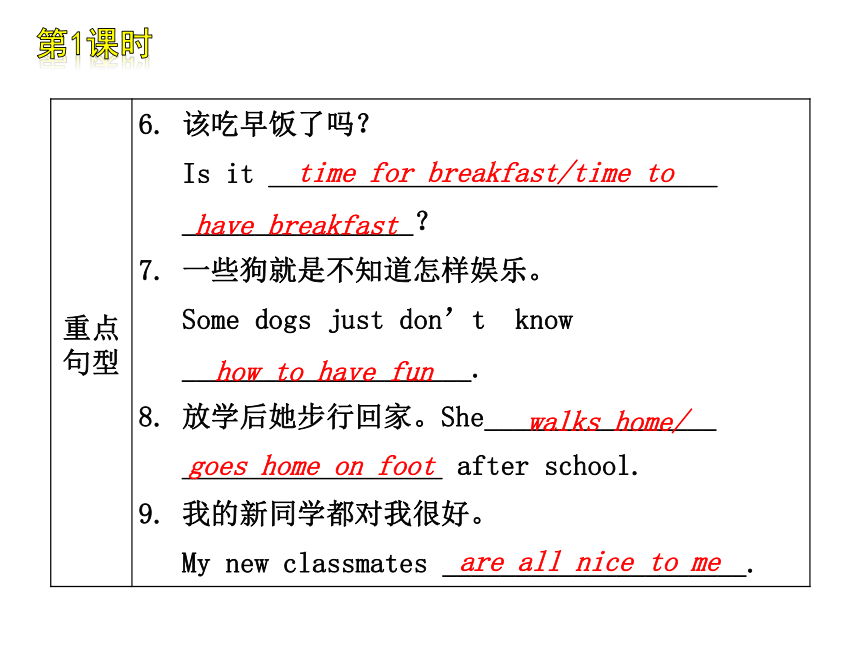
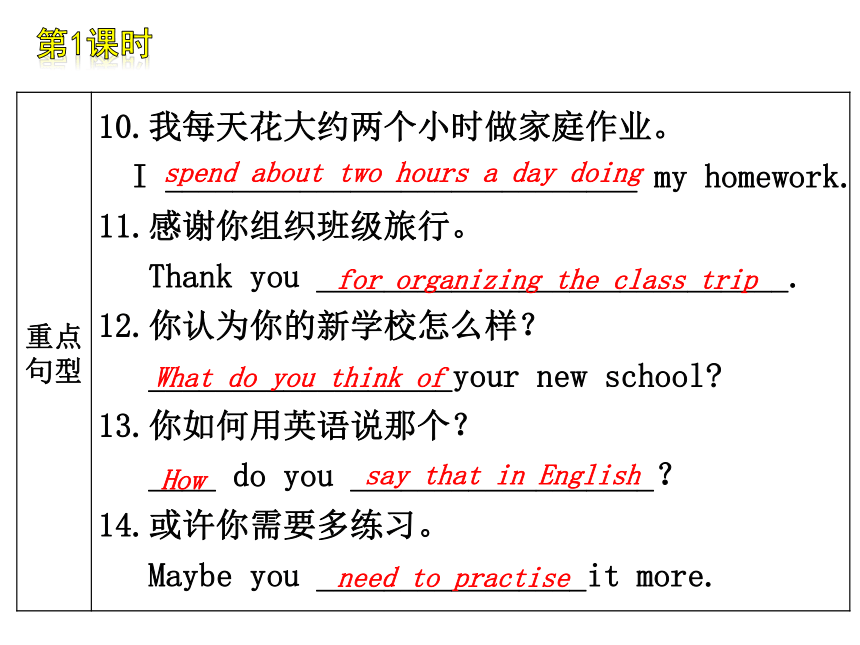
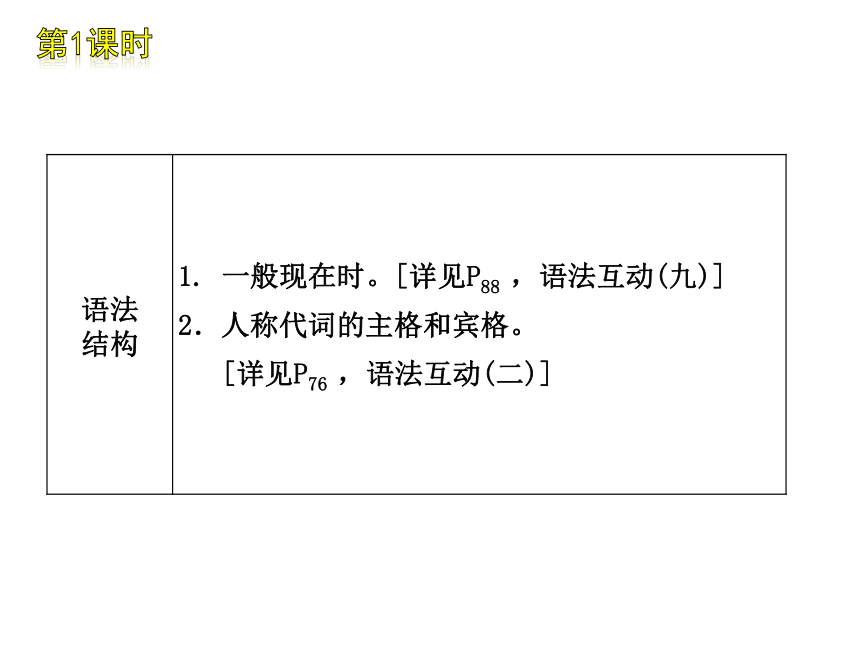
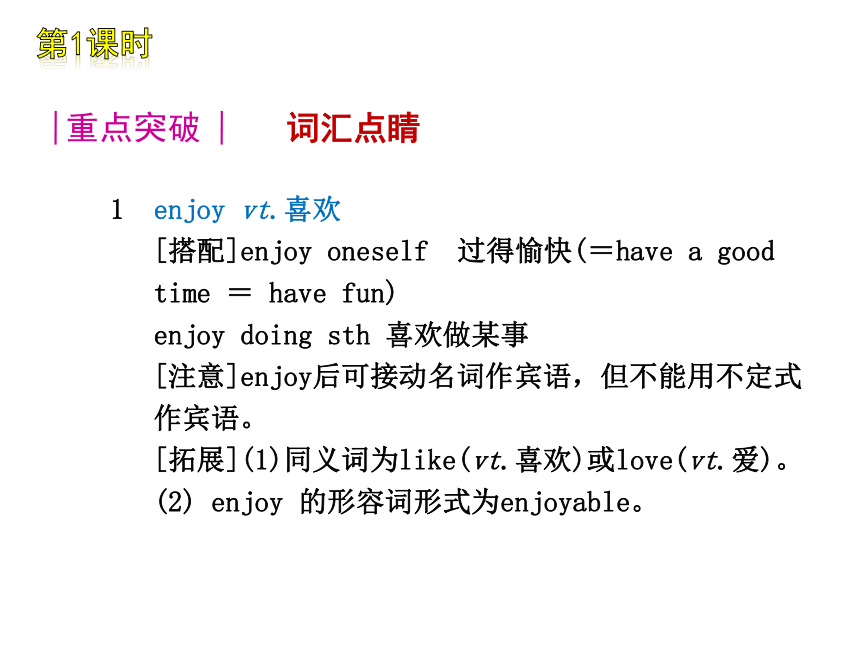
文档简介
(共115张PPT)
2012版中考一轮复习精品课件
牛津译林版
含2011中考真题
七年级上册(3课时)
·译林牛津版
基础过关
·译林牛津版
类别 课标考点要求
词汇
拓展 1. short adj.→________(反义词)
2. swim v.→________ n.游泳
→________ n.游泳者
3.play v.→________ n.
4.fly vt.& vi.→________ (第三人称单数)
long
swimming
swimmer
player
flies
·译林牛津版
词汇
拓展 5.good adj.→________ adv.→________
(比较级)→________ (最高级)
6.library n.→ ________ (复数)
7.both pron. & adv.→________(两者之一)
→ ________ (两者都不)
8.use n.→________adj.(有用的)
→________adj.(无用的)
well
better
best
libraries
either
neither
useful
useless
·译林牛津版
重点
短语
1. 出生,出世 _______________
2.世界杯 ___________________
3.醒过来;叫醒 _____________
4.彼此 ___________________
5.想要 ___________________
6.照看_______________________
7.来自于 ___________________
8.听音乐 ___________________
9.用英语 ___________________
be born
World Cup
wake up
each other
would like
look after/take care of
come from/be from
listen to music
in English
·译林牛津版
重点
短语 10.做早操___________________
11.进行体育运动__________________
12.在午餐时间____________
13.看电视___________
14.请求帮忙______________
15.和某人聊天_____________
16.玩得高兴_________________
17.遇见某人________________
18.期待________________
do morning exercises
play computer games
at lunchtime
watch TV
ask for help
chat with sb
have a great time
meet up with sb
look forward to
·译林牛津版
重点
短语 19.对……有益 _____________
20.为……做准备 _______________
21.一周两次 _______________
22.除了星期一_______________
23.练习做某事_____________________
24. 在互联网上寻找资料
_________________________________
25.在电话中交谈____________________
26.问题的答案 ________________________
be good for
get ready for
twice a week
except Monday
practise doing sth
look for things on the Internet
talk on the phone
an answer to a question
·译林牛津版
重点
句型 1.他擅长数学。He is _________ Maths.
2.我出生在那儿,但我们现在住在北京。
I ____________ there but we __________
Beijing now.
3.我喜欢阅读。 I _______________.
4.周末,我通常跑步半个小时。
_______________,I usually ____________
for half an hour.
5.我可以借用你的橡皮吗?
Can I ____________________?
good at
was born
live in
love reading
At the weekend
go running
borrow your rubber
·译林牛津版
重点
句型 6. 该吃早饭了吗?
Is it _______________________________
________________?
7. 一些狗就是不知道怎样娱乐。
Some dogs just don’t know
____________________.
8. 放学后她步行回家。She________________
__________________ after school.
9. 我的新同学都对我很好。
My new classmates _____________________.
how to have fun
time for breakfast/time to
have breakfast
goes home on foot
walks home/
are all nice to me
·译林牛津版
重点
句型 10.我每天花大约两个小时做家庭作业。
I ____________________________ my homework.
11.感谢你组织班级旅行。
Thank you ____________________________.
12.你认为你的新学校怎么样?
__________________your new school
13.你如何用英语说那个?
____ do you __________________?
14.或许你需要多练习。
Maybe you ________________it more.
spend about two hours a day doing
for organizing the class trip
What do you think of
How
say that in English
need to practise
·译林牛津版
语法
结构 1. 一般现在时。[详见P88 ,语法互动(九)]
2.人称代词的主格和宾格。
[详见P76 ,语法互动(二)]
·译林牛津版
词汇点睛
重点突破
1 enjoy vt.喜欢
[搭配]enjoy oneself 过得愉快(=have a good
time = have fun)
enjoy doing sth 喜欢做某事
[注意]enjoy后可接动名词作宾语,但不能用不定式
作宾语。
[拓展](1)同义词为like(vt.喜欢)或love(vt.爱)。
(2) enjoy 的形容词形式为enjoyable。
·译林牛津版
活学活用
( )[2010·莱芜]Most of the young people enjoy
________ Jay Chou’s songs.
A.sing B.sang
C.singing D.to sing
C
·译林牛津版
2 sometimes adv.有时
[注意] sometime某时;some times几次;
some time一段时间。四词不要混淆。
[拓展] sometimes 是频度副词,相当于at times或
from time to time。对频度副词提问只能用how often。
·译林牛津版
活学活用
根据汉语意思完成句子
(1)He ________ visits his friends at weekends.
有时周末他去看望朋友。
(2)Mum will take me to the park ________ next week.
妈妈将在下周的某时带我去公园。
(3)I have been to Beijing____________.
我去过北京几次。
(4)He spent ____________ painting the wall.
他花了一些时间粉刷墙面。
sometimes
sometime
some times
some time
·译林牛津版
3 walk n. &vi. 散步;步行 vt.带……散步;带……溜弯
[搭配] walk about/around 到处走走;散步
walk into 走进
go for/take a walk 去散步
take sb for a walk 带某人去散步
go walking 去散步
go out for a walk 出去散步
活学活用
( )We often go out for ________ after
supper.
A.walk B.a walk
C.walking D.walks
B
·译林牛津版
4 borrow vt.借;借用
[辨析] borrow和lend
(1)当表示向别人借东西时用borrow;
(2)当表示要把自己的东西借给别人时用lend。
常用搭配有:borrow…from…向/从……
借……lend sth to sb / lend sb sth 把某物借
给某人
[拓展]keep sth (借得后)保存/持某物;keep sth
for+时间,借/保存某物多长时间。
·译林牛津版
活学活用
(1)He has never ________________________.
他从未向我借过钱。
(2)He often ____________ some money.
他经常借些钱给我。
(3)How long can I______________?
我可以借阅这本书多长时间?
borrowed money from me
lends me
keep the book
·译林牛津版
5 each adj.各自的;每个的,每一
pron.各,各自;每个
[搭配] each of………中的每一个
each other彼此
[辨析] every和each
every和each都可意为“每个,各个”,但用法不同:
(1)every强调全体概念,与all相近; each则强调个体
概念。
(2)every指三个或三个以上的人或物; each指两个或两
个以上的人或物。
(3)every只作形容词,后跟名词,不可单独使用;
而each可作代词或形容词。
·译林牛津版
( )[2010·阜康]Earthquakes happen when two
plates (板块) move against ________ other.
A.both B.all
C.each D.every
活学活用
C
·译林牛津版
6 look forward to 期待,盼望
[注意] look forward to 中的to是介词,不能跟动词
原形,只能跟名词,代词或动词的 ing 形式作宾语。
类似词组有pay attention to。
look forward to the coming
活学活用
We all _____________________________ of the holiday.
我们都盼望着假期的到来。
·译林牛津版
句型透视
1 I hope you and your family are well.
我希望你和你的家人身体都很好。
[点拨] 句中的well为形容词,意为“身体好,健康的”,
相当于fine。
[辨析] family, house和home
(1) family意为“家人,家庭成员”。family指家庭成员
时,为集体名词,后接复数谓语动词形式;若把family看
成一个整体,则后接单数谓语动词形式。family也有“家;
家庭”的意思,其复数形式为families。
·译林牛津版
(2)house表示“房屋”,侧重居住的建筑物。
(3)home 指“家”,侧重个人出生、被抚养长大的
环境或居住地。
The whole family
My home
活学活用
(1)____________________ are watching TV.
全家人都在看电视。
(2)______________ is in Beijing.
我的家在北京。
·译林牛津版
2 It is time for breakfast.到吃早饭的时候了。
[点拨] (1)句型It’s time for+名词/代词/动名词意为
“是……的时候了”。句中的it不能用this或that替换,
time前无冠词,也不用复数形式。
(2)It’s time可接(for sb )to do sth,意为“到了(某
人)该做某事的时候了”。
活学活用
(1)____________start our English class.
我们上英语课的时间到了。
(2)______________________leave for Japan.
他该启程前往日本了。
It's time for him to
It's time to
·译林牛津版
3 Excuse me, how do you say that in English
对不起,那个用英语怎么说?
[辨析] say, speak, talk和tell
(1)say强调说的内容,后面可接名词、代词或一个句子。
(2)speak常用来表示“讲某种语言”,后面直接跟表示
某种语言的名词;或表示“讲话,发言”,指说话的能
力。如:speak to sb与某人讲话。
·译林牛津版
(3)talk是“说,谈话”的意思,指连续性的讲话,有
对话的含义;talk与speak意思相近,speak指演说或正
式发言,而talk指一般性的交谈。talk的常用搭配有:
talk to/with sb(与某人交谈),talk about(谈论,讨论)。
(4)tell意为“告诉”,表示“讲故事”或“讲笑话”等
也用tell,强调讲给别人听。tell的常用搭配有:tell
sb sth(告诉某人某事), tell sb about sth(告诉某人
关于某事),tell sb (not) to do sth告诉某人(不)做某事。
·译林牛津版
活学活用
( )(1)Please say it ________ English.
A.with B.on
C.for D.In
( )(2)[2010·日照]My brother once studied in
America for three years, so he
can________ English very well.
A.talk B.speak
C.say D.tell
D
B
·译林牛津版
4 I spend about two hours a day doing my homework.
我每天用大约两个小时做家庭作业。
[辨析] take, spend, cost, buy和pay
这四个词作“花费……时间/钱”讲时的区别:
(1)take通常与表示时间的词语连用,通常由it作形式主
语。用于句型It takes +人+时间+to do sth。
(2)spend表示“花费金钱/时间”,主语通常由人充当。
人+spend+金钱+on+名词;人+spend+时间(+in)
+doing sth。
·译林牛津版
(3)cost表示“花费时间/金钱/劳力等”,通常不能用人
充当主语。物(事)+cost+人+钱。
(4)buy 表示“花费金钱买”,主语通常由人充当。人+
buy+sth+for+sb。
(5)pay表示“付钱”,主语是人。人+pay+金钱+for
+sth。
·译林牛津版
活学活用
( )(1)It will ________ us several years to
learn a foreign language well.
A.cost B.take
C.spend D.use
( )(2)[2010·杭州] Remember to spend some
time ________ your loved ones , because
they’re not going to be around forever.
A.from B.with
C.in D.on
B
B
·译林牛津版
5 Thank you for organizing the class trip.
感谢你组织这次班级旅行。
[点拨] thank sb for doing sth /thanks for doing意
为“感谢某人做某事”。for 是介词,后接动词时要改
为动名词形式
D
活学活用
( )Thank you for ________ me so much help.
A.give B.gives
C.gave D.giving
·译林牛津版
6 What do you think of your new school
你觉得你的新学校怎么样?
[拓展] What do you think of your new school
=How do you like your new school
=How do you find your new school
A
活学活用
( )________ do you think of this book?
A.What B.How
C.Where D.When
·译林牛津版
基础过关
·译林牛津版
类别 课标考点要求
词汇
拓展 1.interest n.&v.→___________ (有趣的)
→___________ (感兴趣的)
2.knife n.→________ (复数)
3.potato n.→___________(复数)
4.difficult adj.→___________ (名词)
interesting
interested
knives
potatoes
difficulty
·译林牛津版
词汇
拓展 5.tooth n.→________ (复数)
6.wonder n.→__________adj. →___________adv.
7.meet v.→__________ n.
8.important adj.→____________ (反义词)
→__________ (名词)
teeth
wonderful
wonderfully
meeting
unimportant
importance
·译林牛津版
重点
短语 1.儿童节________________
2.教师节_______________
3.在星期一____________
4.国庆节_______________
5.装扮成……样子 ________________
6.用许多方法_______________
7.制定一个计划______________
8.在街道的两边 ___________________________
9.一天多次__________________
Children's Day
Teachers' Day
on Monday
National Day
dress up as…
in many ways
make a plan
on both sides of the street
many times a day
·译林牛津版
重点
短语 10.用……制造出…… _______________
11.在某天的晚上 __________________
12.完成某事 __________________
13.改变饮食 __________________
14.吃健康的饭菜 __________________
15.变得疲劳 ____________
16.一个叫作……的游戏 _______________
17.告诉某人关于某事 __________________
18.捉弄某人 _____________________
make…out of…
on the evening of
finish doing sth
change one's diet
have healthy meals
get tired
a game called…
tell sb about sth
play a trick on sb
·译林牛津版
重点
短语 19.过一个长假 ___________________
20.在网上 __________________
21.两餐之间 _______________
22.少看电视 _______________
23.A与B的区别 ______________________________
24.祝某人好运 ___________________
25.从……获取能量 ___________________
26.对某人来说很重要 ___________________
have a long holiday
on the Internet
between meals
watch less TV
the difference between A and B
Good luck with sb
get energy from…
be important for sb
·译林牛津版
重点
句型 1.我们穿着带面具的特别的服装。
We ________ special costumes ________masks.
2.有时候我们在脸上涂上油彩,人们就不知道我们是谁了。
Sometimes we________________, and people do not
know ____________.
3.我们家总是在10月31日晚上举行聚会。
My family always __________________the evening of
October 31st.
4.这就是每个星期我所做的事情。
Here is ____________ every week.
wear
with
paint our faces
who we are
have a party on
what I do
·译林牛津版
重点
句型 5.这是我第一次看舞狮表演,我非常兴奋。
______________________ see Lion dance and I am
very________.
6.我跳舞时,很容易感到疲劳。
_____________________ to get tired when I dance.
7.基蒂多久跳一次舞?
___________does Kitty dance?
8.我喜欢汉堡,但我再也不吃了。
I love hamburgers but I don’t eat them ________
later.
It is my first time to
excited
It's very easy for me
How often
any more
·译林牛津版
重点
句型 9.这顿饭为整个下午和稍后的排球运动提供能量。
This meal ________ energy for the whole afternoon
and for __________________ later.
10.祝你顺利实施你的新饮食和生活计划。
_______________ your new diet and lifestyle!
11.你最喜欢什么节目?
Which is your __________________?
Which festival do ________________?
gives me
Good luck with
favourite festival
you like best
playing volleyball
·译林牛津版
重点
句型 12.我总是把苹果当早饭吃。
I always eat ____________________.
13.桑迪没有多少时间打羽毛球。
Sandy doesn’t ___________________
badminton.
14.你可以喝水而不变胖。
You can drink water__________________.
an apple for breakfast
have much time to play
without getting fat
·译林牛津版
语法
结构 1. 使用介词来谈论时间。[详见P80 ,语法互动(五)]
2. 用wh 疑问词提问。[详见P76 ,语法互动(二)]
3. 用some和any讨论东西的数量。
[详见P76 ,语法互动(二)]
4. 使用频率副词。
5. 区别可数名词与不可数名词。
[详见P75 ,语法互动(一)]
6. 学会使用there be 句式。
[详见P94 ,语法互动(十二)]
·译林牛津版
词汇点睛
重点突破
1 dress v.给……穿衣服 n. 服装
[搭配] dress up as 装扮成
dress sb 给某人穿衣
be dressed in穿着……
[辨析] wear, put on, in, dress和have on
(1)wear意为“穿,戴”,强调状态。
·译林牛津版
(2)put on 意为“穿上,戴上”,强调动作。宾语为代词时需
放在put和on中间;反义词组是take off。
(3)in表示“穿着,戴着”,说明状态。
(4)dress用作不及物动词,指“穿衣服”的动作;
用作及物动词,指“给……穿衣服”。
(5)have on指“穿,戴”,与wear意思相近,强调状态,
但不和进行时连用。宾语为代词时需放在have和on中间。
·译林牛津版
活学活用
选词填空
wear, in, dress, have on, put on
(1)—What size do you _______?
—Size M.
(2)Mr Black ________ his coat and hat, then went out.
(3)The girl ________ a yellow dress is my sister.
(4)She ________ her child quickly.
(5)He always ________ a jacket _____.
(6)He always ________ a jacket.
wear
put on
in
dressed
has
on
wears
·译林牛津版
2 shout v.喊叫
[搭配] shout at 对……大声叫喊
shout to 向……叫喊
[注意] shout at目的性较强,态度不友好;shout to多
表示因距离远、声小听不见而叫喊,不含感彩。
活学活用
( )“Don’t go out ________ the rain ________
an umbrella,” my mother shouted ________ me.
A.in; on; at B.under; with; to
C.under; without; at D.in; without; to
D
·译林牛津版
3 wonderful adj. 棒极了,奇妙的
[拓展] (1)wonder用作名词时,意为“奇迹”;用作及
物动词时,意为“想知道,好奇”。
(2)wonderfully作副词,意为“奇妙地”。
活学活用
用wonderful的适当形式填空
(1)Yesterday Mr Green gave us a __________talk.
(2)Those children finished the work ___________.
(3)I ________ how the people in the past built the
________.
wonderful
wonderfully
wonder
wonder
·译林牛津版
4 hot adj.热的
[拓展] hot的比较级和最高级分别是hotter和hottest。
其名词形式heat,意为“热,热量,热度”。
活学活用
用hot的适当形式填空
(1)It is very________ today. Please open the
window.
(2)Red is the colour of ________ and strong
feelings.
hot
heat
·译林牛津版
5 west n. 西部,西方
[拓展] 形容词western, 意为“西部的,西方的”。
活学活用
用west的适当形式填空
(1)Xinjiang lies in the ________ of China.
(2)Christmas is the most important festival in
________ countries.
west
Western
·译林牛津版
6 energy n. 能源,能量
[拓展] 形容词energetic, 意为“精力充沛的,充满
能量的”。
活学活用
用energy的适当形式填空
(1)I need a lot of ________ to take part in
different activities.
(2)Nick is young and strong. He is __________
all day.
energy
energetic
·译林牛津版
7 healthy adj.健康的,有益健康的
[拓展] healthy的比较级和最高级形式分别是
healthier和healthiest。名词health,意为“健康”;
副词healthily, 意为“健康地”。常用短语有:
stay/keep healthy 保持健康。
活学活用
用healthy的适当形式填空
(1)You should eat _________food every day.
(2)Exercise is good for your__________.
healthy
health
·译林牛津版
8 luck n.运气
[拓展] 形容词lucky,意为“好运的”;副词
luckily, 意为“幸运地”。
[注意] lucky 加上否定前缀un ,即unlucky, 意为
“不幸的”;副词为unluckily, 意为“不幸地”。
·译林牛津版
活学活用
用luck的适当形式填空
(1)—Good ______to you, children.
—Thank you, Miss Gao.
(2)He was ________ enough to pass the exam.
(3)___________, Jim fell off his bike and hurt
himself badly.
luck
lucky
Unluckily
·译林牛津版
9 mean vt. 意味着,意思是
[拓展] 名词meaning, 意为“意义,意思”;形
容词meaningful, 意为“有意义的”。
活学活用
用mean的适当形式填空
(1)What does the word________?
(2)What’s the ____________of the the word
(3)It is ____________to plant trees.
mean
meaning
meaningful
·译林牛津版
句型透视
1 If the children do not get any candy,they
can play a trick on the neighbour.
如果孩子们没有得到糖果,他们就捉弄邻居。
[点拨] (1)这是if(假如)引导的条件状语从句。条
件状语从句和时间状语从句一样,如果主句用将来
时,从句要用一般现在时代替将来时。
(2)play a trick on sb 捉弄某人
[拓展] give sb a treat 招待某人give sb sth=
give sth to sb给某人某物
·译林牛津版
活学活用
(1)You ________ if you don’t study hard.
如果你不努力学习,就会失败。
(2)Don’t _______________ others.
别捉弄别人。
(3)Please ___________ a book.
=Please ________________ me.
请给我一本书。
will fail
play a trick on
give me
give a book to
·译林牛津版
2 We study Maths together.我们一起学数学。
[辨析] study和learn
(1)study指“系统地学习、研究”。可作及物动词,
也可作不及物动词还可作名词用。作不及物动词时,
后常接表示程度的副词hard。
(2)learn指“通过学习获得知识或技能”。learn可
作及物或不及物动词,作不及物动词时,常与介词
about 搭配。
·译林牛津版
活学活用
(1)I have ____________________ carefully.
我已经对那个问题仔细研究过了。
(2)I want to ___________________ history.
我想更多得了解历史。
studied the problem
learn more about
·译林牛津版
3 People celebrate Halloween in many ways.
人们用很多方式庆祝万圣节。
[点拨] (1)celebrate 动词“庆祝”,名词形式
celebration。
(2)way的本意为“路,道路”,在本句中指“方式,
方法”,常和in连用。in many ways意为“用许多
方法”。
·译林牛津版
[拓展] 与way相关的短语:
in this way 用这种方法
in different ways 用不同的方式
in the same way 用同样的方法
by the way 顺便问一下
on one’s way home 在某人回家的路上
the way to 到……的路
in a/one way=in some ways 在某种程度上
lose one’s way=get lost 迷路
·译林牛津版
活学活用
( )Can you tell me the way ________ the park
A.to B.in
C.for D.at
A
·译林牛津版
4 It’s very easy for me to get tired when I dance.
我跳舞的时候很容易感到疲劳。
[点拨] (1)when I dance是时间状语从句。
(2)该句中it是形式主语,真正的主语是后面的动词不定
式to get tired。
①it用作形式主语,除了用动词不定式作真正的主语之
外,也可以用that从句作真正的主语。一些固定的结构
有:It seems that, It happens that, It is said
that等。
②it也可用作形式宾语。
[注意] 作形式主语或形式宾语时,只能用it,不能用
that, this等。
·译林牛津版
活学活用
1.根据汉语意思完成句子
(1)___________________ finish the work on time.
按时完成这项工作是很困难的。
(2)________________ I’ve made a mistake.
我似乎犯了一个错误。
2.单项填空
( )Most young people find ________ exciting to
watch a football match.
A.it B.this
C.that D.one
It's very difficult to
It seems that
A
·译林牛津版
5 How do you carry all that food
你怎么携带所有的食物?
[辨析] carry, take 和 bring
(1)carry意为“搬运、携带”,没有明确的方向性。
(2)take表示“带走、拿走”,是把某物或某人从
说话处带到别处。即动作由近及远。
(3)bring意为“拿来、带来”,是把某人或某物从
别处带到说话处。即动作由远及近。
·译林牛津版
活学活用
(1)He often helps the old man _______________.
他经常帮老人挑水。
(2)Please _______ your brother there tomorrow.
明天请把你弟弟带到那儿去。
(3)____________ the newspaper, please.
请把报纸带给我。
(to) carry water
take
Bring me
·译林牛津版
6 Let’s celebrate。 让我们庆祝吧。
[点拨] (1)let’s do sth “咱们做某事吧”,用
来提出建议;反意疑问句的句型为:Let’s do sth ,
shall we
(2)let us do sth“让我们做某事吧”用来向第三者
提出请求,以得到别人的允许;反意疑问句的句型
为:Let us do sth, will you
·译林牛津版
[拓展] (1)其他用来提出请求的句式有:
①How/What about doing sth
②Shall we/I do sth
③Why don’t you/not do sth
④You’d better do sth.
⑤Could/Would you do sth
(2)常用应答有:
①That sounds good.
②Sounds like fun/great.
③Good idea.
④Why not…?
·译林牛津版
活学活用
1.同义句转换
Why not go to the park
___________ ________ ________to the park
2.用let’s 或 let us 填空
(1)________sing for Tom’s success, shall we
(2)________count the boys, will you
3.单项填空
( )—Let’s go fishing on Sunday.
—________.
A.Good idea B.Excuse me
C.You’re welcome D.It doesn’t matter
going
What/ How
about
Let's
Let us
A
·译林牛津版
7 How often does kitty dance
基蒂多久跳一次舞?
[辨析] how often, how long, how much, how many,
how soon, how far和how old
(1)how often “多久一次”,用于提问频度副词或词组。
(2)how long “多长”,用于提问时间或物体的长度。
(3)how much用于提问不可数名词的量或价格。
(4)how many 用于提问可数名词的量。
(5)how soon “多久之后”,用于提问“in+一段时
间,”常用于将来时中。
(6)how far “多远”,提问距离。
(7)how old “多大”,提问年龄。
·译林牛津版
活学活用
( )(1)—________are you going to finish writing the
story
—In about five days.
A.How often B.How soon
C.How long D.How fast
( )(2)—________has Yao Ming taken part in world
competitions
—I’ve no idea. Let’s find it out on the
Internet.
A.How long B.How soon
C.How many times D.How far
B
C
·译林牛津版
高频考点
( )1.A terrible earthquake happened in Japan
________ March, 2011.
A.to B. on C. in D. at
( )2.[2011·广安]—Oh, so many people in the park
—Nobody likes to stay at home ________
Sunday morning.
A.in B.on C.at
( )3.[2011·乐山]—Do you often go fishing with
your father
—No, ________. I don’t like fishing at all.
A.never B.always C.usually
C
B
A
·译林牛津版
( )4.[2011·重庆] Could you please get me some
________? I’m hungry.
A.apple B.water
C.bread D.egg
( )5.—________ an Art Festival in your school
each term
—No, but there is an English party.
A.Are there B.Is there
C.Do we have D.Does have
C
B
·译林牛津版
基础过关
·译林牛津版
类别 课标考点要求
词汇
拓展 1. expensive adj. → ________ (反义词)
2.visit vt. → ________ n.
3.colour n.→ _________ adj.
4.comfort vt. → ___________ adj.
→ ___________ adv.
cheap
visitor
colourful
comfortable
comfortably
·译林牛津版
词汇
拓展 5.walkman n.→ __________ (复数)
6.final adj. → _______(副词)
→ ________________(2个同义词组)
7.inside prep. → ________(反义词)
8.invite vt. → _________n.
walkmans
finally
at last/ in the end
outside
invitation
·译林牛津版
重点
短语
1. 稍等片刻 _______________
2.此刻,现在 ________________
3.去购物 ______________
4.和某人一起玩 _____________
5.寻找 __________
6.不同种类的书 ______________________
7.等轮到我 _________________
8.付款 _________
just a minute
at the moment
play with sb
look for
different kinds of books
wait for my turn
pay for
go shopping
·译林牛津版
重点
短语 9.试穿 ________
10.开灯 __________________
11.再过十分钟 __________________
12.与……相配 ____________
13.一双运动鞋 _________________
14.邀请他吃饭 _______________________
15.在20世纪 ____________________
16.作一个有关……的演讲 _________________
try on
turn on the lights
ten more minutes
go well with
a pair of trainers
invite him to have dinner
in the 20th century
give a talk on…
·译林牛津版
重点
短语
17.参加服装秀 _______________________
18.完成做鞋的工作 _____________________
19.需要一些运动 _____________________
20.犯了一些错误 ______________________
21.用……制成 _________________
22.许愿 ________________
23.留20世纪90年代发型
__________________________
24.捐一些钱给 _________________________
25.为……筹钱 ____________________
join in the fashion show
finish making shoes
need some exercise
make some mistakes
be made of…
make wishes
wear hair in a 1990s style
donate some money (to…)
raise money for…
·译林牛津版
重点
句型 1. 这些卡片多少钱?
____________ do the cards _______?
2. 我想给西蒙和桑迪买些礼物,但我不想买和埃米一
样的东西。
I want to ____________________Simon and Sandy
but I don't want to buy ________________ Amy
did.
3. 我们可以在运动用品商店找到适合他的东西。
We can find _________________ him in a sports
shop.
How much
cost
buy some presents for
the same things as
something good for
·译林牛津版
重点
句型 4.现在是下午四点半。
It's __________ four in the afternoon.
5.这家购物中心的确是个好玩的去处。
The mall is a really fun ___________.
6.那么我就能在床上再待十分钟了。
I can ______________________ in bed then.
7.今天我们要向你们展示20世纪70年代到90年代的服装。
Today we are going to show you clothes
________________________.
half past
place to go
spend 10 more minutes
from the 1970s to the 1990s
·译林牛津版
重点
句型 8.你穿白色裤子,系红黄相间的领带,看上去真酷。
You ________________ trousers and yellow
and red tie.
9.它们一定既轻便又舒服。
They _________light and comfortable.
10.你的海报进展如何,桑迪?
______________________, Sandy?
look cool in white
must be
How's your poster going
·译林牛津版
重点
句型 11. 你好!我能为你做什么?
Hello, __________ you
=What ___________ you
12.去年的贺卡有折扣。
There ____________ on last year's cards.
13.它们与她最喜欢的T恤很匹配。
They __________________ T shirt.
14.我不知道今天该穿什么。
I don't know ____________ today.
Can I help
is a discount
match her favourite
what to wear
can I do for
·译林牛津版
语法
结构 1. 现在进行时。
[详见P88 ,语法互动(九)]
2.情态动词can和may的用法。
[详见P86,语法互动(八)]
·译林牛津版
词汇点睛
重点突破
1 turn n.转动;(依次轮到的)机会
[搭配] take turns in sth / to do sth 轮流做某事
read the text in turn 依次读课文
in turn 交替地;轮流地
活学活用
(1)How many _______ are necessary
需要转动几次?
(2)It's __________ to speak at the meeting.
轮到你在会上发言了。
turns
your turn
·译林牛津版
2 pay vi.& vt.付钱;给……报酬
[注意] pay 是不规则动词,其过去式,过去分词都
为paid。
[搭配] pay for 付款
pay…for…花……钱买……
pay back 付清(账单、债务);偿还,偿付
pay a visit 访问
pay attention to 注意
·译林牛津版
活学活用
用括号中所给词的适当形式填空
The children had fun ________ (climb) the hill.
3 fun n.娱乐,玩笑,嬉笑;有趣的人或事物 adj.有趣的
[搭配] have fun doing sth 开心做某事
good/great fun有趣的人(事物)
make fun of sb 嘲弄、取笑某人
climbing
·译林牛津版
4 boring adj.乏味的,无聊的
[拓展] bore n.令人讨厌的人或事 vt.使厌烦
[注意] boring和bored同为bore转化而来的形容
词,但boring强调事物本身的特点,而bored强调
人的感受。英语中许多词都具有这个特点,如:
interest转化来的形容词interesting和
interested,excite转化来的形容词exciting和
excited, surprise转化来的形容词surprising和
surprised等。
·译林牛津版
活学活用
用括号中所给词的适当形式填空
We were __________ at the __________
news.(surprise)
Students get ____________in the
___________ game.(interest)
surprised
surprising
interested
interesting
·译林牛津版
5 choose v.选择
[搭配] choose to do sth 选择做某事
choose how to do sth 选择如何做某事
choose sb as/to be…选某人当……
[拓展] choose的过去式为chose, 过去分词为chosen,
现在分词为choosing。名词为choice, 如:
make a choice 作出选择
·译林牛津版
活学活用
( ) —Would you please tell Miss Li that she ______
as a volunteer for the activity
—Of course . I will tell her tomorrow.
A.choose
B.chose
C.has chosen
D.has been chosen
D
·译林牛津版
6 be made of 由……制成
[拓展] be made from 由……制成
be made out of 由……制成
be made in+地点,在某地制造
be made into 制成……
be made by+sb 由(谁)制造
be made up of 由……组/构成
[注意] be made of制成品仍可以看出原材料;而be
made from制成品经过化学变化,看不出原材料。
·译林牛津版
活学活用
1.单项填空
( )The brown desk ________ of wood.
A.make B.made
C.is made D.makes
2.根据汉语意思完成句子
(1)This ________________________my father.
这个木质玩具是我爸爸做的。
(2)That __________________________ three hundred
parts.
那辆现代的电动车是由三百个部件构成的。
C
wooden toy was made by
modern e bike is made up of
·译林牛津版
7 keep v.保持;使保持某种状态
[归纳] (1)keep+形容词,表示“保持某种状态”。
keep+动名词,表示“一直做某事”。
(2)keep+sb/sth+形容词,表示“让某人(物)保持某
种状态”。
(3)keep+sb/sth+表地点的介词短语,表示“让某人
(物)一直在某地”。
(4)keep sb/sth (on) doing sth 表示“让某人(物)不断
做某事”。
·译林牛津版
(5)keep sb / sth from doing sth 表示“阻止、防止某人(物)做某事”,相当于stop / prevent sb / sth (from) doing sth。
例:You must keep him in the room until he gets well.你必须让他待在房间里直到他病好了。
They kept the machine working every day.
他们让机器每天不停地运转。
Forests can keep water from running away.
森林能够防止水分流失。
·译林牛津版
活学活用
1.单项填空
( )(1)If people ________ cutting down the forest,
they will have nowhere________.
A.keep; to live in B.will keep; to live in
C.keep; to live D.will keep; to live
( )(2)How long can I ________this magazine
A.borrow B.return
C.buy D.keep
2.用所给词的适当形式填空
We should think about what we can do________(keep) animals and plants from becoming endangered.
C
D
to keep
·译林牛津版
8 show v.& n. 展览;演出,表演
(1)v.给……看show sb sth=show sth to sb 给某人看某物
(2)v.表现,显露;表示
show off 给人看,炫耀 show up 出席,到场
(3)v.为……领路
show sb around带领某人参观
show sb in(out)领某 人进来(出去)
(4)n.展示on show展出
·译林牛津版
活学活用
1.单项填空
( )(1)Though you have made great progress, you
shouldn't________.
A.show off B.show up
C.turn off D.turn on
( )(2)Many people are interested in the pictures
________ show.
A.at B.On C.of D.in
2.根据汉语意思完成句子
He ________ me ________ his school that day.
那天他带着我在他学校四处看了看。
A
B
showed
around
·译林牛津版
9 be good for对……有好处
[辨析] be good for, be good with, be good at和be good to
with…和……相处的好 = get on well
for …对……有好处;反义词组为be bad for …
at…擅长……=do well in … ; 反义词组为
be weak/do hardly in…
for …对……有好处;反义词组为be bad for …
be good +
例: Reading is good for us but reading in bed is bad for our eyes.
读书对我们有好处,但躺在床上看书对我们的眼睛不好。
The teacher is good with all the children.
这个老师和所有的孩子相处得都很好。
·译林牛津版
活学活用
根据汉语意思完成句子
(1)I’m good _______ ________ while my sister does well
_______ dancing.
我擅长唱歌而我姐姐擅长跳舞。
(2)Try to ________ ________ ________ yourself!
尝试对自己好一点!
at
singing
in
be
kind
to
·译林牛津版
句型透视
1 I need you to carry all the bags.
我需要你帮忙拎所有的包。
[点拨] (1)need可用作及物动词,表示“需要”,后面
可跟各种结构:①名词或代词; ②不定式;③动名
词(这时动名词与主语有动宾关系)。
(2)need还可用作情态动词,主要用于否定句和疑问
句中。
·译林牛津版
活学活用
1.根据汉语意思完成句子
I don't think you ________________.
我认为你不必发愁。
2.单项填空
( ) My bike is broken . It needs ________.
A.repair B.repairing
C.repaired D.to repair
need to worry
B
·译林牛津版
2 I want to buy something for him.
我想给他买点东西。
[点拨] buy sth for sb = buy sb sth
给某人买某物
类似的短语有:
make sb sth = make sth for sb
给某人制作某物
cook sb sth=cook sth for sb为某人烹饪某物
read sb sth= read sth for sb为某人读某物
get sb sth= get sth for sb为某人获取某物
draw sb sth= draw sth for sb为某人画某物
·译林牛津版
活学活用
同义句转换
My mother bought me a new bike.
My mother ________ a new bike ________ me.
bought
for
·译林牛津版
3 How much do the cards cost
这些卡片多少钱?
[点拨] (1)询问价钱用how much。
(2)how much常表示“多少”,后可跟不可数名词。
(3)How much do the cards cost = How much are
the cards?=What's the price of the cards
(4)cost 的主语一般是物。
活学活用
( )________ are these shoes
A.How many B.How much
C.How long D.How
B
·译林牛津版
4 Oh, these clips are beautiful, and they match her favorite T shirt.
噢,这些夹子真漂亮,并且与她最喜爱的T恤衫相配。
[点拨] match意为“与……相配”,尤其指颜色。例:
The curtain doesn't match the paint.
这个窗帘和这种漆的颜色不搭配。
活学活用
( )This T shirt ________ your trousers well.
A.match B.matches
C.matching D.is matched
B
·译林牛津版
5 Oh! I don't have enough money to buy her a CD
then.
噢!那么我没有足够的钱给她买一张碟片。
[点拨] (1)enough意为“充足的”。enough修饰名词
既可以放在名词的前面,也可以放在名词的后面。
(2)enough用作副词,修饰形容词或副词时要放在
所修饰词的后面。
(3)enough用作代词“足够,够多”。Have you had
enough?你吃饱了吗?
(4)enough 用作形容词,副词时,没有比较级,最
高级形式。
·译林牛津版
活学活用
1.根据汉语意思完成句子
Don't worry . We __________________ go there.
别担心,我们有充足的时间去那里。
2.单项填空
( )The door is not ________ for the elephant to pass.
A.wide enough B.widely enough
C.enough wide D.enough widely
have enough time to
A
·译林牛津版
6 Can I help you
您买东西吗?(或:我能为您效劳吗?)
[点拨] 这是服务员常说的一句话。常用于商店、宾馆、
饭店、图书馆等场所。
Can I help you?=What can I do for you
·译林牛津版
活学活用
( ) —________?
—Yes . I'd like to buy a pair of shoes for my
mother.
A.What can you do for me
B.What do you want to buy
C.What would you like to buy
D.Can I help you
D
·译林牛津版
7 His clothes are from the 1980s.
他的服装是20世纪80年代的风格。
[点拨] the 1980s意为 “ 20世纪80年代 ”。
in the 1980's=in the 1980s意为 “在20世纪80年代 ”。
in 1980则意为 “在1980年”。
活学活用
( )A war took place in ________.
A.the 1720's B.1720s
C.1720's D.the 1720
A
·译林牛津版
8 She looks cool!她看上去很酷。
[点拨] look cool 看上去酷。look 连系动词,后接形容词
作表语,形成系表结构。
常见的连系动词如下:look 看上去; sound 听起来;
smell 闻起来; taste 尝起来; turn 变成;
become 变得; go 变成; get 变得; grow 渐渐变得;
be是; seem 似乎; feel 感到。
[注意] 有些动词既是连系动词又是行为动词。通常情况
下行为动词后应用副词修饰,连系动词后应接形容词作
表语。例:
He looks angry.(连系动词)
He looks at me angrily.(行为动词)
·译林牛津版
[拓展] 常用的与look构成的其他短语有:
look for 寻找
look up 抬头看,查寻
look after 照看
look around 四处看看
look down upon 看不起
look through 透过……看
活学活用
( )[2010·衢州]—Shall we go for a picnic in the park
this Saturday
—Oh, that ________ good.
A.feels B.looks C.tastes D.sounds
D
【2011四川内江】
33. — Which scarf do you prefer
—The red one. It _____ more comfortable.
A. tastes B. feels C. gets
答案:B
【解析】词义辨析。taste 品尝;feel 感觉;get变得。根据句意,你比较喜欢哪一条围巾?红色的。它感到更舒服。选B。
【2011安徽】
46. The food here smells good, but what does it like
A. taste B. touch C. seem D. feel
答案:A
【解析】选A。句意:这种食物闻起来很好,但是(尝)起来怎么样呢? Taste“尝起来”;
touch “触摸”; seem “好像”;feel like “想要”。结合句意选A。
2012版中考一轮复习精品课件
牛津译林版
含2011中考真题
七年级上册(3课时)
·译林牛津版
基础过关
·译林牛津版
类别 课标考点要求
词汇
拓展 1. short adj.→________(反义词)
2. swim v.→________ n.游泳
→________ n.游泳者
3.play v.→________ n.
4.fly vt.& vi.→________ (第三人称单数)
long
swimming
swimmer
player
flies
·译林牛津版
词汇
拓展 5.good adj.→________ adv.→________
(比较级)→________ (最高级)
6.library n.→ ________ (复数)
7.both pron. & adv.→________(两者之一)
→ ________ (两者都不)
8.use n.→________adj.(有用的)
→________adj.(无用的)
well
better
best
libraries
either
neither
useful
useless
·译林牛津版
重点
短语
1. 出生,出世 _______________
2.世界杯 ___________________
3.醒过来;叫醒 _____________
4.彼此 ___________________
5.想要 ___________________
6.照看_______________________
7.来自于 ___________________
8.听音乐 ___________________
9.用英语 ___________________
be born
World Cup
wake up
each other
would like
look after/take care of
come from/be from
listen to music
in English
·译林牛津版
重点
短语 10.做早操___________________
11.进行体育运动__________________
12.在午餐时间____________
13.看电视___________
14.请求帮忙______________
15.和某人聊天_____________
16.玩得高兴_________________
17.遇见某人________________
18.期待________________
do morning exercises
play computer games
at lunchtime
watch TV
ask for help
chat with sb
have a great time
meet up with sb
look forward to
·译林牛津版
重点
短语 19.对……有益 _____________
20.为……做准备 _______________
21.一周两次 _______________
22.除了星期一_______________
23.练习做某事_____________________
24. 在互联网上寻找资料
_________________________________
25.在电话中交谈____________________
26.问题的答案 ________________________
be good for
get ready for
twice a week
except Monday
practise doing sth
look for things on the Internet
talk on the phone
an answer to a question
·译林牛津版
重点
句型 1.他擅长数学。He is _________ Maths.
2.我出生在那儿,但我们现在住在北京。
I ____________ there but we __________
Beijing now.
3.我喜欢阅读。 I _______________.
4.周末,我通常跑步半个小时。
_______________,I usually ____________
for half an hour.
5.我可以借用你的橡皮吗?
Can I ____________________?
good at
was born
live in
love reading
At the weekend
go running
borrow your rubber
·译林牛津版
重点
句型 6. 该吃早饭了吗?
Is it _______________________________
________________?
7. 一些狗就是不知道怎样娱乐。
Some dogs just don’t know
____________________.
8. 放学后她步行回家。She________________
__________________ after school.
9. 我的新同学都对我很好。
My new classmates _____________________.
how to have fun
time for breakfast/time to
have breakfast
goes home on foot
walks home/
are all nice to me
·译林牛津版
重点
句型 10.我每天花大约两个小时做家庭作业。
I ____________________________ my homework.
11.感谢你组织班级旅行。
Thank you ____________________________.
12.你认为你的新学校怎么样?
__________________your new school
13.你如何用英语说那个?
____ do you __________________?
14.或许你需要多练习。
Maybe you ________________it more.
spend about two hours a day doing
for organizing the class trip
What do you think of
How
say that in English
need to practise
·译林牛津版
语法
结构 1. 一般现在时。[详见P88 ,语法互动(九)]
2.人称代词的主格和宾格。
[详见P76 ,语法互动(二)]
·译林牛津版
词汇点睛
重点突破
1 enjoy vt.喜欢
[搭配]enjoy oneself 过得愉快(=have a good
time = have fun)
enjoy doing sth 喜欢做某事
[注意]enjoy后可接动名词作宾语,但不能用不定式
作宾语。
[拓展](1)同义词为like(vt.喜欢)或love(vt.爱)。
(2) enjoy 的形容词形式为enjoyable。
·译林牛津版
活学活用
( )[2010·莱芜]Most of the young people enjoy
________ Jay Chou’s songs.
A.sing B.sang
C.singing D.to sing
C
·译林牛津版
2 sometimes adv.有时
[注意] sometime某时;some times几次;
some time一段时间。四词不要混淆。
[拓展] sometimes 是频度副词,相当于at times或
from time to time。对频度副词提问只能用how often。
·译林牛津版
活学活用
根据汉语意思完成句子
(1)He ________ visits his friends at weekends.
有时周末他去看望朋友。
(2)Mum will take me to the park ________ next week.
妈妈将在下周的某时带我去公园。
(3)I have been to Beijing____________.
我去过北京几次。
(4)He spent ____________ painting the wall.
他花了一些时间粉刷墙面。
sometimes
sometime
some times
some time
·译林牛津版
3 walk n. &vi. 散步;步行 vt.带……散步;带……溜弯
[搭配] walk about/around 到处走走;散步
walk into 走进
go for/take a walk 去散步
take sb for a walk 带某人去散步
go walking 去散步
go out for a walk 出去散步
活学活用
( )We often go out for ________ after
supper.
A.walk B.a walk
C.walking D.walks
B
·译林牛津版
4 borrow vt.借;借用
[辨析] borrow和lend
(1)当表示向别人借东西时用borrow;
(2)当表示要把自己的东西借给别人时用lend。
常用搭配有:borrow…from…向/从……
借……lend sth to sb / lend sb sth 把某物借
给某人
[拓展]keep sth (借得后)保存/持某物;keep sth
for+时间,借/保存某物多长时间。
·译林牛津版
活学活用
(1)He has never ________________________.
他从未向我借过钱。
(2)He often ____________ some money.
他经常借些钱给我。
(3)How long can I______________?
我可以借阅这本书多长时间?
borrowed money from me
lends me
keep the book
·译林牛津版
5 each adj.各自的;每个的,每一
pron.各,各自;每个
[搭配] each of………中的每一个
each other彼此
[辨析] every和each
every和each都可意为“每个,各个”,但用法不同:
(1)every强调全体概念,与all相近; each则强调个体
概念。
(2)every指三个或三个以上的人或物; each指两个或两
个以上的人或物。
(3)every只作形容词,后跟名词,不可单独使用;
而each可作代词或形容词。
·译林牛津版
( )[2010·阜康]Earthquakes happen when two
plates (板块) move against ________ other.
A.both B.all
C.each D.every
活学活用
C
·译林牛津版
6 look forward to 期待,盼望
[注意] look forward to 中的to是介词,不能跟动词
原形,只能跟名词,代词或动词的 ing 形式作宾语。
类似词组有pay attention to。
look forward to the coming
活学活用
We all _____________________________ of the holiday.
我们都盼望着假期的到来。
·译林牛津版
句型透视
1 I hope you and your family are well.
我希望你和你的家人身体都很好。
[点拨] 句中的well为形容词,意为“身体好,健康的”,
相当于fine。
[辨析] family, house和home
(1) family意为“家人,家庭成员”。family指家庭成员
时,为集体名词,后接复数谓语动词形式;若把family看
成一个整体,则后接单数谓语动词形式。family也有“家;
家庭”的意思,其复数形式为families。
·译林牛津版
(2)house表示“房屋”,侧重居住的建筑物。
(3)home 指“家”,侧重个人出生、被抚养长大的
环境或居住地。
The whole family
My home
活学活用
(1)____________________ are watching TV.
全家人都在看电视。
(2)______________ is in Beijing.
我的家在北京。
·译林牛津版
2 It is time for breakfast.到吃早饭的时候了。
[点拨] (1)句型It’s time for+名词/代词/动名词意为
“是……的时候了”。句中的it不能用this或that替换,
time前无冠词,也不用复数形式。
(2)It’s time可接(for sb )to do sth,意为“到了(某
人)该做某事的时候了”。
活学活用
(1)____________start our English class.
我们上英语课的时间到了。
(2)______________________leave for Japan.
他该启程前往日本了。
It's time for him to
It's time to
·译林牛津版
3 Excuse me, how do you say that in English
对不起,那个用英语怎么说?
[辨析] say, speak, talk和tell
(1)say强调说的内容,后面可接名词、代词或一个句子。
(2)speak常用来表示“讲某种语言”,后面直接跟表示
某种语言的名词;或表示“讲话,发言”,指说话的能
力。如:speak to sb与某人讲话。
·译林牛津版
(3)talk是“说,谈话”的意思,指连续性的讲话,有
对话的含义;talk与speak意思相近,speak指演说或正
式发言,而talk指一般性的交谈。talk的常用搭配有:
talk to/with sb(与某人交谈),talk about(谈论,讨论)。
(4)tell意为“告诉”,表示“讲故事”或“讲笑话”等
也用tell,强调讲给别人听。tell的常用搭配有:tell
sb sth(告诉某人某事), tell sb about sth(告诉某人
关于某事),tell sb (not) to do sth告诉某人(不)做某事。
·译林牛津版
活学活用
( )(1)Please say it ________ English.
A.with B.on
C.for D.In
( )(2)[2010·日照]My brother once studied in
America for three years, so he
can________ English very well.
A.talk B.speak
C.say D.tell
D
B
·译林牛津版
4 I spend about two hours a day doing my homework.
我每天用大约两个小时做家庭作业。
[辨析] take, spend, cost, buy和pay
这四个词作“花费……时间/钱”讲时的区别:
(1)take通常与表示时间的词语连用,通常由it作形式主
语。用于句型It takes +人+时间+to do sth。
(2)spend表示“花费金钱/时间”,主语通常由人充当。
人+spend+金钱+on+名词;人+spend+时间(+in)
+doing sth。
·译林牛津版
(3)cost表示“花费时间/金钱/劳力等”,通常不能用人
充当主语。物(事)+cost+人+钱。
(4)buy 表示“花费金钱买”,主语通常由人充当。人+
buy+sth+for+sb。
(5)pay表示“付钱”,主语是人。人+pay+金钱+for
+sth。
·译林牛津版
活学活用
( )(1)It will ________ us several years to
learn a foreign language well.
A.cost B.take
C.spend D.use
( )(2)[2010·杭州] Remember to spend some
time ________ your loved ones , because
they’re not going to be around forever.
A.from B.with
C.in D.on
B
B
·译林牛津版
5 Thank you for organizing the class trip.
感谢你组织这次班级旅行。
[点拨] thank sb for doing sth /thanks for doing意
为“感谢某人做某事”。for 是介词,后接动词时要改
为动名词形式
D
活学活用
( )Thank you for ________ me so much help.
A.give B.gives
C.gave D.giving
·译林牛津版
6 What do you think of your new school
你觉得你的新学校怎么样?
[拓展] What do you think of your new school
=How do you like your new school
=How do you find your new school
A
活学活用
( )________ do you think of this book?
A.What B.How
C.Where D.When
·译林牛津版
基础过关
·译林牛津版
类别 课标考点要求
词汇
拓展 1.interest n.&v.→___________ (有趣的)
→___________ (感兴趣的)
2.knife n.→________ (复数)
3.potato n.→___________(复数)
4.difficult adj.→___________ (名词)
interesting
interested
knives
potatoes
difficulty
·译林牛津版
词汇
拓展 5.tooth n.→________ (复数)
6.wonder n.→__________adj. →___________adv.
7.meet v.→__________ n.
8.important adj.→____________ (反义词)
→__________ (名词)
teeth
wonderful
wonderfully
meeting
unimportant
importance
·译林牛津版
重点
短语 1.儿童节________________
2.教师节_______________
3.在星期一____________
4.国庆节_______________
5.装扮成……样子 ________________
6.用许多方法_______________
7.制定一个计划______________
8.在街道的两边 ___________________________
9.一天多次__________________
Children's Day
Teachers' Day
on Monday
National Day
dress up as…
in many ways
make a plan
on both sides of the street
many times a day
·译林牛津版
重点
短语 10.用……制造出…… _______________
11.在某天的晚上 __________________
12.完成某事 __________________
13.改变饮食 __________________
14.吃健康的饭菜 __________________
15.变得疲劳 ____________
16.一个叫作……的游戏 _______________
17.告诉某人关于某事 __________________
18.捉弄某人 _____________________
make…out of…
on the evening of
finish doing sth
change one's diet
have healthy meals
get tired
a game called…
tell sb about sth
play a trick on sb
·译林牛津版
重点
短语 19.过一个长假 ___________________
20.在网上 __________________
21.两餐之间 _______________
22.少看电视 _______________
23.A与B的区别 ______________________________
24.祝某人好运 ___________________
25.从……获取能量 ___________________
26.对某人来说很重要 ___________________
have a long holiday
on the Internet
between meals
watch less TV
the difference between A and B
Good luck with sb
get energy from…
be important for sb
·译林牛津版
重点
句型 1.我们穿着带面具的特别的服装。
We ________ special costumes ________masks.
2.有时候我们在脸上涂上油彩,人们就不知道我们是谁了。
Sometimes we________________, and people do not
know ____________.
3.我们家总是在10月31日晚上举行聚会。
My family always __________________the evening of
October 31st.
4.这就是每个星期我所做的事情。
Here is ____________ every week.
wear
with
paint our faces
who we are
have a party on
what I do
·译林牛津版
重点
句型 5.这是我第一次看舞狮表演,我非常兴奋。
______________________ see Lion dance and I am
very________.
6.我跳舞时,很容易感到疲劳。
_____________________ to get tired when I dance.
7.基蒂多久跳一次舞?
___________does Kitty dance?
8.我喜欢汉堡,但我再也不吃了。
I love hamburgers but I don’t eat them ________
later.
It is my first time to
excited
It's very easy for me
How often
any more
·译林牛津版
重点
句型 9.这顿饭为整个下午和稍后的排球运动提供能量。
This meal ________ energy for the whole afternoon
and for __________________ later.
10.祝你顺利实施你的新饮食和生活计划。
_______________ your new diet and lifestyle!
11.你最喜欢什么节目?
Which is your __________________?
Which festival do ________________?
gives me
Good luck with
favourite festival
you like best
playing volleyball
·译林牛津版
重点
句型 12.我总是把苹果当早饭吃。
I always eat ____________________.
13.桑迪没有多少时间打羽毛球。
Sandy doesn’t ___________________
badminton.
14.你可以喝水而不变胖。
You can drink water__________________.
an apple for breakfast
have much time to play
without getting fat
·译林牛津版
语法
结构 1. 使用介词来谈论时间。[详见P80 ,语法互动(五)]
2. 用wh 疑问词提问。[详见P76 ,语法互动(二)]
3. 用some和any讨论东西的数量。
[详见P76 ,语法互动(二)]
4. 使用频率副词。
5. 区别可数名词与不可数名词。
[详见P75 ,语法互动(一)]
6. 学会使用there be 句式。
[详见P94 ,语法互动(十二)]
·译林牛津版
词汇点睛
重点突破
1 dress v.给……穿衣服 n. 服装
[搭配] dress up as 装扮成
dress sb 给某人穿衣
be dressed in穿着……
[辨析] wear, put on, in, dress和have on
(1)wear意为“穿,戴”,强调状态。
·译林牛津版
(2)put on 意为“穿上,戴上”,强调动作。宾语为代词时需
放在put和on中间;反义词组是take off。
(3)in表示“穿着,戴着”,说明状态。
(4)dress用作不及物动词,指“穿衣服”的动作;
用作及物动词,指“给……穿衣服”。
(5)have on指“穿,戴”,与wear意思相近,强调状态,
但不和进行时连用。宾语为代词时需放在have和on中间。
·译林牛津版
活学活用
选词填空
wear, in, dress, have on, put on
(1)—What size do you _______?
—Size M.
(2)Mr Black ________ his coat and hat, then went out.
(3)The girl ________ a yellow dress is my sister.
(4)She ________ her child quickly.
(5)He always ________ a jacket _____.
(6)He always ________ a jacket.
wear
put on
in
dressed
has
on
wears
·译林牛津版
2 shout v.喊叫
[搭配] shout at 对……大声叫喊
shout to 向……叫喊
[注意] shout at目的性较强,态度不友好;shout to多
表示因距离远、声小听不见而叫喊,不含感彩。
活学活用
( )“Don’t go out ________ the rain ________
an umbrella,” my mother shouted ________ me.
A.in; on; at B.under; with; to
C.under; without; at D.in; without; to
D
·译林牛津版
3 wonderful adj. 棒极了,奇妙的
[拓展] (1)wonder用作名词时,意为“奇迹”;用作及
物动词时,意为“想知道,好奇”。
(2)wonderfully作副词,意为“奇妙地”。
活学活用
用wonderful的适当形式填空
(1)Yesterday Mr Green gave us a __________talk.
(2)Those children finished the work ___________.
(3)I ________ how the people in the past built the
________.
wonderful
wonderfully
wonder
wonder
·译林牛津版
4 hot adj.热的
[拓展] hot的比较级和最高级分别是hotter和hottest。
其名词形式heat,意为“热,热量,热度”。
活学活用
用hot的适当形式填空
(1)It is very________ today. Please open the
window.
(2)Red is the colour of ________ and strong
feelings.
hot
heat
·译林牛津版
5 west n. 西部,西方
[拓展] 形容词western, 意为“西部的,西方的”。
活学活用
用west的适当形式填空
(1)Xinjiang lies in the ________ of China.
(2)Christmas is the most important festival in
________ countries.
west
Western
·译林牛津版
6 energy n. 能源,能量
[拓展] 形容词energetic, 意为“精力充沛的,充满
能量的”。
活学活用
用energy的适当形式填空
(1)I need a lot of ________ to take part in
different activities.
(2)Nick is young and strong. He is __________
all day.
energy
energetic
·译林牛津版
7 healthy adj.健康的,有益健康的
[拓展] healthy的比较级和最高级形式分别是
healthier和healthiest。名词health,意为“健康”;
副词healthily, 意为“健康地”。常用短语有:
stay/keep healthy 保持健康。
活学活用
用healthy的适当形式填空
(1)You should eat _________food every day.
(2)Exercise is good for your__________.
healthy
health
·译林牛津版
8 luck n.运气
[拓展] 形容词lucky,意为“好运的”;副词
luckily, 意为“幸运地”。
[注意] lucky 加上否定前缀un ,即unlucky, 意为
“不幸的”;副词为unluckily, 意为“不幸地”。
·译林牛津版
活学活用
用luck的适当形式填空
(1)—Good ______to you, children.
—Thank you, Miss Gao.
(2)He was ________ enough to pass the exam.
(3)___________, Jim fell off his bike and hurt
himself badly.
luck
lucky
Unluckily
·译林牛津版
9 mean vt. 意味着,意思是
[拓展] 名词meaning, 意为“意义,意思”;形
容词meaningful, 意为“有意义的”。
活学活用
用mean的适当形式填空
(1)What does the word________?
(2)What’s the ____________of the the word
(3)It is ____________to plant trees.
mean
meaning
meaningful
·译林牛津版
句型透视
1 If the children do not get any candy,they
can play a trick on the neighbour.
如果孩子们没有得到糖果,他们就捉弄邻居。
[点拨] (1)这是if(假如)引导的条件状语从句。条
件状语从句和时间状语从句一样,如果主句用将来
时,从句要用一般现在时代替将来时。
(2)play a trick on sb 捉弄某人
[拓展] give sb a treat 招待某人give sb sth=
give sth to sb给某人某物
·译林牛津版
活学活用
(1)You ________ if you don’t study hard.
如果你不努力学习,就会失败。
(2)Don’t _______________ others.
别捉弄别人。
(3)Please ___________ a book.
=Please ________________ me.
请给我一本书。
will fail
play a trick on
give me
give a book to
·译林牛津版
2 We study Maths together.我们一起学数学。
[辨析] study和learn
(1)study指“系统地学习、研究”。可作及物动词,
也可作不及物动词还可作名词用。作不及物动词时,
后常接表示程度的副词hard。
(2)learn指“通过学习获得知识或技能”。learn可
作及物或不及物动词,作不及物动词时,常与介词
about 搭配。
·译林牛津版
活学活用
(1)I have ____________________ carefully.
我已经对那个问题仔细研究过了。
(2)I want to ___________________ history.
我想更多得了解历史。
studied the problem
learn more about
·译林牛津版
3 People celebrate Halloween in many ways.
人们用很多方式庆祝万圣节。
[点拨] (1)celebrate 动词“庆祝”,名词形式
celebration。
(2)way的本意为“路,道路”,在本句中指“方式,
方法”,常和in连用。in many ways意为“用许多
方法”。
·译林牛津版
[拓展] 与way相关的短语:
in this way 用这种方法
in different ways 用不同的方式
in the same way 用同样的方法
by the way 顺便问一下
on one’s way home 在某人回家的路上
the way to 到……的路
in a/one way=in some ways 在某种程度上
lose one’s way=get lost 迷路
·译林牛津版
活学活用
( )Can you tell me the way ________ the park
A.to B.in
C.for D.at
A
·译林牛津版
4 It’s very easy for me to get tired when I dance.
我跳舞的时候很容易感到疲劳。
[点拨] (1)when I dance是时间状语从句。
(2)该句中it是形式主语,真正的主语是后面的动词不定
式to get tired。
①it用作形式主语,除了用动词不定式作真正的主语之
外,也可以用that从句作真正的主语。一些固定的结构
有:It seems that, It happens that, It is said
that等。
②it也可用作形式宾语。
[注意] 作形式主语或形式宾语时,只能用it,不能用
that, this等。
·译林牛津版
活学活用
1.根据汉语意思完成句子
(1)___________________ finish the work on time.
按时完成这项工作是很困难的。
(2)________________ I’ve made a mistake.
我似乎犯了一个错误。
2.单项填空
( )Most young people find ________ exciting to
watch a football match.
A.it B.this
C.that D.one
It's very difficult to
It seems that
A
·译林牛津版
5 How do you carry all that food
你怎么携带所有的食物?
[辨析] carry, take 和 bring
(1)carry意为“搬运、携带”,没有明确的方向性。
(2)take表示“带走、拿走”,是把某物或某人从
说话处带到别处。即动作由近及远。
(3)bring意为“拿来、带来”,是把某人或某物从
别处带到说话处。即动作由远及近。
·译林牛津版
活学活用
(1)He often helps the old man _______________.
他经常帮老人挑水。
(2)Please _______ your brother there tomorrow.
明天请把你弟弟带到那儿去。
(3)____________ the newspaper, please.
请把报纸带给我。
(to) carry water
take
Bring me
·译林牛津版
6 Let’s celebrate。 让我们庆祝吧。
[点拨] (1)let’s do sth “咱们做某事吧”,用
来提出建议;反意疑问句的句型为:Let’s do sth ,
shall we
(2)let us do sth“让我们做某事吧”用来向第三者
提出请求,以得到别人的允许;反意疑问句的句型
为:Let us do sth, will you
·译林牛津版
[拓展] (1)其他用来提出请求的句式有:
①How/What about doing sth
②Shall we/I do sth
③Why don’t you/not do sth
④You’d better do sth.
⑤Could/Would you do sth
(2)常用应答有:
①That sounds good.
②Sounds like fun/great.
③Good idea.
④Why not…?
·译林牛津版
活学活用
1.同义句转换
Why not go to the park
___________ ________ ________to the park
2.用let’s 或 let us 填空
(1)________sing for Tom’s success, shall we
(2)________count the boys, will you
3.单项填空
( )—Let’s go fishing on Sunday.
—________.
A.Good idea B.Excuse me
C.You’re welcome D.It doesn’t matter
going
What/ How
about
Let's
Let us
A
·译林牛津版
7 How often does kitty dance
基蒂多久跳一次舞?
[辨析] how often, how long, how much, how many,
how soon, how far和how old
(1)how often “多久一次”,用于提问频度副词或词组。
(2)how long “多长”,用于提问时间或物体的长度。
(3)how much用于提问不可数名词的量或价格。
(4)how many 用于提问可数名词的量。
(5)how soon “多久之后”,用于提问“in+一段时
间,”常用于将来时中。
(6)how far “多远”,提问距离。
(7)how old “多大”,提问年龄。
·译林牛津版
活学活用
( )(1)—________are you going to finish writing the
story
—In about five days.
A.How often B.How soon
C.How long D.How fast
( )(2)—________has Yao Ming taken part in world
competitions
—I’ve no idea. Let’s find it out on the
Internet.
A.How long B.How soon
C.How many times D.How far
B
C
·译林牛津版
高频考点
( )1.A terrible earthquake happened in Japan
________ March, 2011.
A.to B. on C. in D. at
( )2.[2011·广安]—Oh, so many people in the park
—Nobody likes to stay at home ________
Sunday morning.
A.in B.on C.at
( )3.[2011·乐山]—Do you often go fishing with
your father
—No, ________. I don’t like fishing at all.
A.never B.always C.usually
C
B
A
·译林牛津版
( )4.[2011·重庆] Could you please get me some
________? I’m hungry.
A.apple B.water
C.bread D.egg
( )5.—________ an Art Festival in your school
each term
—No, but there is an English party.
A.Are there B.Is there
C.Do we have D.Does have
C
B
·译林牛津版
基础过关
·译林牛津版
类别 课标考点要求
词汇
拓展 1. expensive adj. → ________ (反义词)
2.visit vt. → ________ n.
3.colour n.→ _________ adj.
4.comfort vt. → ___________ adj.
→ ___________ adv.
cheap
visitor
colourful
comfortable
comfortably
·译林牛津版
词汇
拓展 5.walkman n.→ __________ (复数)
6.final adj. → _______(副词)
→ ________________(2个同义词组)
7.inside prep. → ________(反义词)
8.invite vt. → _________n.
walkmans
finally
at last/ in the end
outside
invitation
·译林牛津版
重点
短语
1. 稍等片刻 _______________
2.此刻,现在 ________________
3.去购物 ______________
4.和某人一起玩 _____________
5.寻找 __________
6.不同种类的书 ______________________
7.等轮到我 _________________
8.付款 _________
just a minute
at the moment
play with sb
look for
different kinds of books
wait for my turn
pay for
go shopping
·译林牛津版
重点
短语 9.试穿 ________
10.开灯 __________________
11.再过十分钟 __________________
12.与……相配 ____________
13.一双运动鞋 _________________
14.邀请他吃饭 _______________________
15.在20世纪 ____________________
16.作一个有关……的演讲 _________________
try on
turn on the lights
ten more minutes
go well with
a pair of trainers
invite him to have dinner
in the 20th century
give a talk on…
·译林牛津版
重点
短语
17.参加服装秀 _______________________
18.完成做鞋的工作 _____________________
19.需要一些运动 _____________________
20.犯了一些错误 ______________________
21.用……制成 _________________
22.许愿 ________________
23.留20世纪90年代发型
__________________________
24.捐一些钱给 _________________________
25.为……筹钱 ____________________
join in the fashion show
finish making shoes
need some exercise
make some mistakes
be made of…
make wishes
wear hair in a 1990s style
donate some money (to…)
raise money for…
·译林牛津版
重点
句型 1. 这些卡片多少钱?
____________ do the cards _______?
2. 我想给西蒙和桑迪买些礼物,但我不想买和埃米一
样的东西。
I want to ____________________Simon and Sandy
but I don't want to buy ________________ Amy
did.
3. 我们可以在运动用品商店找到适合他的东西。
We can find _________________ him in a sports
shop.
How much
cost
buy some presents for
the same things as
something good for
·译林牛津版
重点
句型 4.现在是下午四点半。
It's __________ four in the afternoon.
5.这家购物中心的确是个好玩的去处。
The mall is a really fun ___________.
6.那么我就能在床上再待十分钟了。
I can ______________________ in bed then.
7.今天我们要向你们展示20世纪70年代到90年代的服装。
Today we are going to show you clothes
________________________.
half past
place to go
spend 10 more minutes
from the 1970s to the 1990s
·译林牛津版
重点
句型 8.你穿白色裤子,系红黄相间的领带,看上去真酷。
You ________________ trousers and yellow
and red tie.
9.它们一定既轻便又舒服。
They _________light and comfortable.
10.你的海报进展如何,桑迪?
______________________, Sandy?
look cool in white
must be
How's your poster going
·译林牛津版
重点
句型 11. 你好!我能为你做什么?
Hello, __________ you
=What ___________ you
12.去年的贺卡有折扣。
There ____________ on last year's cards.
13.它们与她最喜欢的T恤很匹配。
They __________________ T shirt.
14.我不知道今天该穿什么。
I don't know ____________ today.
Can I help
is a discount
match her favourite
what to wear
can I do for
·译林牛津版
语法
结构 1. 现在进行时。
[详见P88 ,语法互动(九)]
2.情态动词can和may的用法。
[详见P86,语法互动(八)]
·译林牛津版
词汇点睛
重点突破
1 turn n.转动;(依次轮到的)机会
[搭配] take turns in sth / to do sth 轮流做某事
read the text in turn 依次读课文
in turn 交替地;轮流地
活学活用
(1)How many _______ are necessary
需要转动几次?
(2)It's __________ to speak at the meeting.
轮到你在会上发言了。
turns
your turn
·译林牛津版
2 pay vi.& vt.付钱;给……报酬
[注意] pay 是不规则动词,其过去式,过去分词都
为paid。
[搭配] pay for 付款
pay…for…花……钱买……
pay back 付清(账单、债务);偿还,偿付
pay a visit 访问
pay attention to 注意
·译林牛津版
活学活用
用括号中所给词的适当形式填空
The children had fun ________ (climb) the hill.
3 fun n.娱乐,玩笑,嬉笑;有趣的人或事物 adj.有趣的
[搭配] have fun doing sth 开心做某事
good/great fun有趣的人(事物)
make fun of sb 嘲弄、取笑某人
climbing
·译林牛津版
4 boring adj.乏味的,无聊的
[拓展] bore n.令人讨厌的人或事 vt.使厌烦
[注意] boring和bored同为bore转化而来的形容
词,但boring强调事物本身的特点,而bored强调
人的感受。英语中许多词都具有这个特点,如:
interest转化来的形容词interesting和
interested,excite转化来的形容词exciting和
excited, surprise转化来的形容词surprising和
surprised等。
·译林牛津版
活学活用
用括号中所给词的适当形式填空
We were __________ at the __________
news.(surprise)
Students get ____________in the
___________ game.(interest)
surprised
surprising
interested
interesting
·译林牛津版
5 choose v.选择
[搭配] choose to do sth 选择做某事
choose how to do sth 选择如何做某事
choose sb as/to be…选某人当……
[拓展] choose的过去式为chose, 过去分词为chosen,
现在分词为choosing。名词为choice, 如:
make a choice 作出选择
·译林牛津版
活学活用
( ) —Would you please tell Miss Li that she ______
as a volunteer for the activity
—Of course . I will tell her tomorrow.
A.choose
B.chose
C.has chosen
D.has been chosen
D
·译林牛津版
6 be made of 由……制成
[拓展] be made from 由……制成
be made out of 由……制成
be made in+地点,在某地制造
be made into 制成……
be made by+sb 由(谁)制造
be made up of 由……组/构成
[注意] be made of制成品仍可以看出原材料;而be
made from制成品经过化学变化,看不出原材料。
·译林牛津版
活学活用
1.单项填空
( )The brown desk ________ of wood.
A.make B.made
C.is made D.makes
2.根据汉语意思完成句子
(1)This ________________________my father.
这个木质玩具是我爸爸做的。
(2)That __________________________ three hundred
parts.
那辆现代的电动车是由三百个部件构成的。
C
wooden toy was made by
modern e bike is made up of
·译林牛津版
7 keep v.保持;使保持某种状态
[归纳] (1)keep+形容词,表示“保持某种状态”。
keep+动名词,表示“一直做某事”。
(2)keep+sb/sth+形容词,表示“让某人(物)保持某
种状态”。
(3)keep+sb/sth+表地点的介词短语,表示“让某人
(物)一直在某地”。
(4)keep sb/sth (on) doing sth 表示“让某人(物)不断
做某事”。
·译林牛津版
(5)keep sb / sth from doing sth 表示“阻止、防止某人(物)做某事”,相当于stop / prevent sb / sth (from) doing sth。
例:You must keep him in the room until he gets well.你必须让他待在房间里直到他病好了。
They kept the machine working every day.
他们让机器每天不停地运转。
Forests can keep water from running away.
森林能够防止水分流失。
·译林牛津版
活学活用
1.单项填空
( )(1)If people ________ cutting down the forest,
they will have nowhere________.
A.keep; to live in B.will keep; to live in
C.keep; to live D.will keep; to live
( )(2)How long can I ________this magazine
A.borrow B.return
C.buy D.keep
2.用所给词的适当形式填空
We should think about what we can do________(keep) animals and plants from becoming endangered.
C
D
to keep
·译林牛津版
8 show v.& n. 展览;演出,表演
(1)v.给……看show sb sth=show sth to sb 给某人看某物
(2)v.表现,显露;表示
show off 给人看,炫耀 show up 出席,到场
(3)v.为……领路
show sb around带领某人参观
show sb in(out)领某 人进来(出去)
(4)n.展示on show展出
·译林牛津版
活学活用
1.单项填空
( )(1)Though you have made great progress, you
shouldn't________.
A.show off B.show up
C.turn off D.turn on
( )(2)Many people are interested in the pictures
________ show.
A.at B.On C.of D.in
2.根据汉语意思完成句子
He ________ me ________ his school that day.
那天他带着我在他学校四处看了看。
A
B
showed
around
·译林牛津版
9 be good for对……有好处
[辨析] be good for, be good with, be good at和be good to
with…和……相处的好 = get on well
for …对……有好处;反义词组为be bad for …
at…擅长……=do well in … ; 反义词组为
be weak/do hardly in…
for …对……有好处;反义词组为be bad for …
be good +
例: Reading is good for us but reading in bed is bad for our eyes.
读书对我们有好处,但躺在床上看书对我们的眼睛不好。
The teacher is good with all the children.
这个老师和所有的孩子相处得都很好。
·译林牛津版
活学活用
根据汉语意思完成句子
(1)I’m good _______ ________ while my sister does well
_______ dancing.
我擅长唱歌而我姐姐擅长跳舞。
(2)Try to ________ ________ ________ yourself!
尝试对自己好一点!
at
singing
in
be
kind
to
·译林牛津版
句型透视
1 I need you to carry all the bags.
我需要你帮忙拎所有的包。
[点拨] (1)need可用作及物动词,表示“需要”,后面
可跟各种结构:①名词或代词; ②不定式;③动名
词(这时动名词与主语有动宾关系)。
(2)need还可用作情态动词,主要用于否定句和疑问
句中。
·译林牛津版
活学活用
1.根据汉语意思完成句子
I don't think you ________________.
我认为你不必发愁。
2.单项填空
( ) My bike is broken . It needs ________.
A.repair B.repairing
C.repaired D.to repair
need to worry
B
·译林牛津版
2 I want to buy something for him.
我想给他买点东西。
[点拨] buy sth for sb = buy sb sth
给某人买某物
类似的短语有:
make sb sth = make sth for sb
给某人制作某物
cook sb sth=cook sth for sb为某人烹饪某物
read sb sth= read sth for sb为某人读某物
get sb sth= get sth for sb为某人获取某物
draw sb sth= draw sth for sb为某人画某物
·译林牛津版
活学活用
同义句转换
My mother bought me a new bike.
My mother ________ a new bike ________ me.
bought
for
·译林牛津版
3 How much do the cards cost
这些卡片多少钱?
[点拨] (1)询问价钱用how much。
(2)how much常表示“多少”,后可跟不可数名词。
(3)How much do the cards cost = How much are
the cards?=What's the price of the cards
(4)cost 的主语一般是物。
活学活用
( )________ are these shoes
A.How many B.How much
C.How long D.How
B
·译林牛津版
4 Oh, these clips are beautiful, and they match her favorite T shirt.
噢,这些夹子真漂亮,并且与她最喜爱的T恤衫相配。
[点拨] match意为“与……相配”,尤其指颜色。例:
The curtain doesn't match the paint.
这个窗帘和这种漆的颜色不搭配。
活学活用
( )This T shirt ________ your trousers well.
A.match B.matches
C.matching D.is matched
B
·译林牛津版
5 Oh! I don't have enough money to buy her a CD
then.
噢!那么我没有足够的钱给她买一张碟片。
[点拨] (1)enough意为“充足的”。enough修饰名词
既可以放在名词的前面,也可以放在名词的后面。
(2)enough用作副词,修饰形容词或副词时要放在
所修饰词的后面。
(3)enough用作代词“足够,够多”。Have you had
enough?你吃饱了吗?
(4)enough 用作形容词,副词时,没有比较级,最
高级形式。
·译林牛津版
活学活用
1.根据汉语意思完成句子
Don't worry . We __________________ go there.
别担心,我们有充足的时间去那里。
2.单项填空
( )The door is not ________ for the elephant to pass.
A.wide enough B.widely enough
C.enough wide D.enough widely
have enough time to
A
·译林牛津版
6 Can I help you
您买东西吗?(或:我能为您效劳吗?)
[点拨] 这是服务员常说的一句话。常用于商店、宾馆、
饭店、图书馆等场所。
Can I help you?=What can I do for you
·译林牛津版
活学活用
( ) —________?
—Yes . I'd like to buy a pair of shoes for my
mother.
A.What can you do for me
B.What do you want to buy
C.What would you like to buy
D.Can I help you
D
·译林牛津版
7 His clothes are from the 1980s.
他的服装是20世纪80年代的风格。
[点拨] the 1980s意为 “ 20世纪80年代 ”。
in the 1980's=in the 1980s意为 “在20世纪80年代 ”。
in 1980则意为 “在1980年”。
活学活用
( )A war took place in ________.
A.the 1720's B.1720s
C.1720's D.the 1720
A
·译林牛津版
8 She looks cool!她看上去很酷。
[点拨] look cool 看上去酷。look 连系动词,后接形容词
作表语,形成系表结构。
常见的连系动词如下:look 看上去; sound 听起来;
smell 闻起来; taste 尝起来; turn 变成;
become 变得; go 变成; get 变得; grow 渐渐变得;
be是; seem 似乎; feel 感到。
[注意] 有些动词既是连系动词又是行为动词。通常情况
下行为动词后应用副词修饰,连系动词后应接形容词作
表语。例:
He looks angry.(连系动词)
He looks at me angrily.(行为动词)
·译林牛津版
[拓展] 常用的与look构成的其他短语有:
look for 寻找
look up 抬头看,查寻
look after 照看
look around 四处看看
look down upon 看不起
look through 透过……看
活学活用
( )[2010·衢州]—Shall we go for a picnic in the park
this Saturday
—Oh, that ________ good.
A.feels B.looks C.tastes D.sounds
D
【2011四川内江】
33. — Which scarf do you prefer
—The red one. It _____ more comfortable.
A. tastes B. feels C. gets
答案:B
【解析】词义辨析。taste 品尝;feel 感觉;get变得。根据句意,你比较喜欢哪一条围巾?红色的。它感到更舒服。选B。
【2011安徽】
46. The food here smells good, but what does it like
A. taste B. touch C. seem D. feel
答案:A
【解析】选A。句意:这种食物闻起来很好,但是(尝)起来怎么样呢? Taste“尝起来”;
touch “触摸”; seem “好像”;feel like “想要”。结合句意选A。
